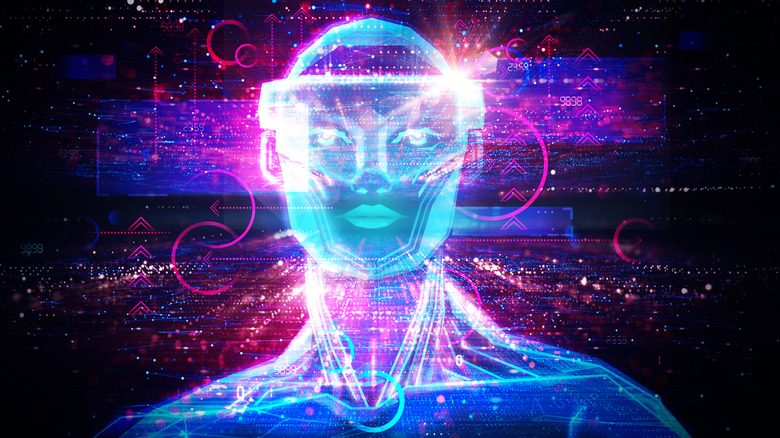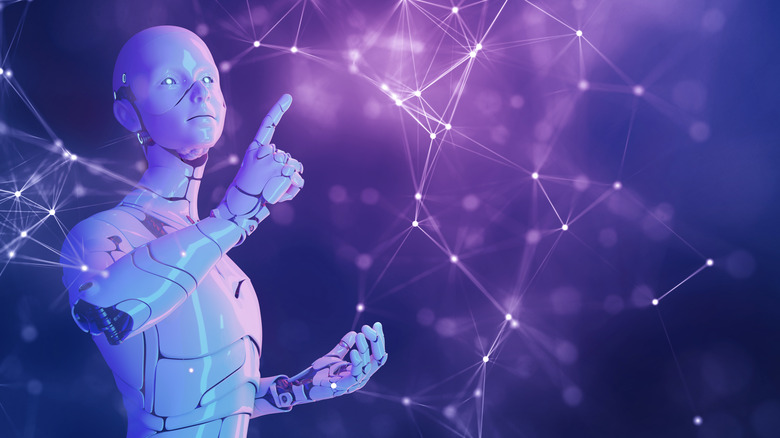The Harrowing Conspiracy Theory That Claims The Internet Is 'Dead'
Here's a not-too-radical sentiment for you: The internet is a soulless, dead place full of fakery, asinine behavior, and lorded over by transactional, money-grubbing powers obsessed with generating as much empty, ad-driven content as possible for the purpose of amping up emotionally-driven factionalism that in turn drives up algorithmically-ruled greed that drains humanity of its last vestiges of grace, dignity, and warmth. Sound about right? Ah, but we mean that the internet is not just dead in this way, but truly, truly devoid of human presence. Like, every single article you read, every single person you meet, every single interaction and block of text is all 100% artificial intelligence-generated.
That's the Dead Internet Theory in a nutshell, as sites like The Atlantic describe. Calling it a "theory" inaccurately places it in the same echelon as actual science, but as the above description illustrates, the sentiment seems possible enough. It's an echo of the same disconnection, digital ennui, and emptiness that's intermittently plagued anyone who's spent time online. The Dead Internet Theory is like everyone's worst fears and anxieties about the internet taken to the extreme, which helps explain why it's gotten traction even as a fringe belief. Besides, AI really is playing more of a prominent role in artistic (like Dream by WOMBO) and written (like ChatGPT) ventures that produce kinda-sorta human-like works. But how did the Dead Internet Theory start? How did it spread? What are its specifics? Let's have a look. And don't worry: AI didn't write this article.
Touched by the algorithm
So you've noticed how lots of people repeat the same terms or phrases online, right? "First!" "Bump," or whatever else. Out of all the world's 1.5 billion English speakers (per Statista) and all the endless combinations of words pluckable from our collective garden of linguistic creativity, that's all that people got? Sure, not every sentence needs to be bursting with idiosyncratic brilliance, but still. Even longer phrases sometimes look copy-pasted, or at least so derivative or stock that you could swap out the writer for a bot, and no one would know.
To illustrate, The Atlantic cites one particular fake-looking account by Twitter user @_capr1corn. The account has 25,000 followers. Tweets include "i'll risk it all for you," "sushi makes me happy," and "i want," often coupled with royalty-free-looking photos. There's a generic zoomed-in selfie profile photo and a totally black banner. Is the person even real?
These are the kinds of observations that gave rise to the Dead Internet Theory. For users on 4chan, Wizardchan, Reddit, and more, online banality is evidence of a greater, pervasive secret: it's all fake. The internet isn't just full of basic people — it's not full of people at all. It's bot-land. The Dead Internet Theory started and spread through forums such as those and percolated amongst legions of disaffected netizens. And now? The original Dead Internet Theory mega-thread on Agora Road has nearly 250,000 views at the time of writing.
The endless content reel
Even disregarding Dead Internet Theory for the moment, we know that AI is all but consuming our online world bit by bit. One short video on Twitter shows a click farm full rooms of automated computers and phones operated by AI that scroll, click, post, use fake accounts, and so on. Judging by comments, however, some users think that this video is also fake. Then there's Deepfake tools like DeepfakesWeb, AI writing tools like the aforementioned ChatGPT, and more. It's enough to make people doubt practically anything and everything.
Back in 2018, Intelligencer ran an article describing how less than 60% of internet activity was generated by people — the rest was AI self-generating a supply of content that it itself consumes. Sometimes malware infects a computer and silently cycles through empty "spoofed" websites that contain no real information but report back to advertisers nonetheless regarding fraudulently successful ad engagement. Meanwhile, The New York Times cites a recent 2022 study by Europol Innovation Lab that estimates that as much as 90% of all online content could be completely fake in a few years' time.
All this is actually happening and is not a part of the Dead Internet Theory — it's just reality. It's enough to make users on Reddit pine for "the old internet," or the World Economic Forum to investigate how to take back the internet from the hands of ad-obsessed Big Tech. So then, does the Dead Internet Theory really seem all that implausible?
Fake news, fake people, fake world
Someone is going to raise their hand at this point and say, "Hang on, my aunt is on Facebook. She's a real person ... right?" It depends on what kind of "real" you're talking about, but yes, we all know actual people who've distilled themselves into online personas. Unless your aunt died, and a bot took over her account. Or she was dead all along and you were talking to a shapeshifting lizard person who pretends to go wild for boxed Chardonnay at Thanksgiving. And maybe those shapeshifting lizard people are part of a global Illuminati conspiracy to not only take over the government but to place themselves in key positions of power in Silicon Valley to blah, blah, blah. You get the point?
The Dead Internet Theory seems extra plausible because we live amidst rampant, echo-chambered disinformation and evermore whac-a-mole conspiracy-of-the-week nonsense. We've got classics like the moon landing being faked, new contenders like microchips in COVID-19 vaccines, Pizzagate, Roswell, Flat Earthers, etc., as Live Science outlines. There are communities of online devotees for each belief. But if you think such paranoia is new, New York Magazine has a list of 50 years' worth of conspiracy headlines that include "The Nazis Came from Middle Earth," "AIDS Is a Bioweapon," "Stephen King Killed John Lennon," and many more. The internet, which for ad revenue purposes recommends to people information they prefer, has only exacerbated the issue. It's rendered the democratization of information effectively "dead."
The mind in the machine
Alright, you say. If the Dead Internet Theory is real, who's behind it and why? As Futurism quotes Agora Road user IlluminatiPirate — one of, if not the main, progenitor of Dead Internet Theory who perfectly verbalized public sentiment — as explaining, "The U.S. government is engaging in an artificial intelligence-powered gaslighting of the entire world population." The user outlines how the internet died officially from 2016 to 2017 and drafts a timeline of government-and-tech-driven origins: DARPA canceling its Lifelog project and Facebook's creation (2004), the Smith-Mundt Modernization Act legalizing U.S. government propaganda against citizens (2012), DARPA and the NSA passing contracts along to mega-corporations like Google and Facebook (2012 to 2016), etc.
Folks might notice some immediate and obvious issues with these assertions. The internet isn't confined to the United States, although the user speaks solely from a U.S. netizen's perspective. What about other governments? Or other companies worldwide, large and small, fundamental to every piece of content creation, backend architecture, and more? Like most conspiracies, believers have to expand the conspiratorial web in order to avoid answering those types of questions. It's not just DARPA and Google, they'd say — it's all governments and internet-adjacent industries everywhere, all the time. And yet, when companies like Facebook — Meta, excuse us — want everyone to live in a real-life "Ready Player One" avatar-based virtual world and economy, as The New Yorker describes, the difference between Dead Internet Theory and real life might seem irrelevant.
Spotting a fake
In the end, what are we to make of the Dead Internet Theory? Toss our hands up and bemoan this veil of corporation-and-government-throttled tears? Skulk in outcast enclaves that deride all the witless normies listening to pop music, posting pictures of cats, scrolling Instagram, etc.? Every generation has sneered in similar ways, including the rollover of generations linked to internet nostalgia.
Rather than buy into Dead Internet Theory outright and succumb to the same mechanisms of inculcation derided by its believers, sites like Thought Science offer a thoughtful perspective. As the suggestion goes, folks can use even mainstream platforms to find like-minded people of any bend, like a virtual version of the weird, cool bar you stumbled across on a trip one time. Ignore the noise — all the bland noise and sterile voices — that seems prepped to steer the world even further toward inanity and focus on your actual friends and loved ones.
As far as fake information is concerned, countries like Finland have started creating classes — actual school classes for kids like 8th graders — that teach youngsters how to spot online misinformation. Finland, it should be noted, ranks #1 out of 41 European countries in "resilience potential to fake news," as a study by the Open Society Institute — Sofia concludes. And that's something we all want, right? To not fall prey to liars? So buck up. Even a drab and soulless internet is only as dead as its most hopeless users.





